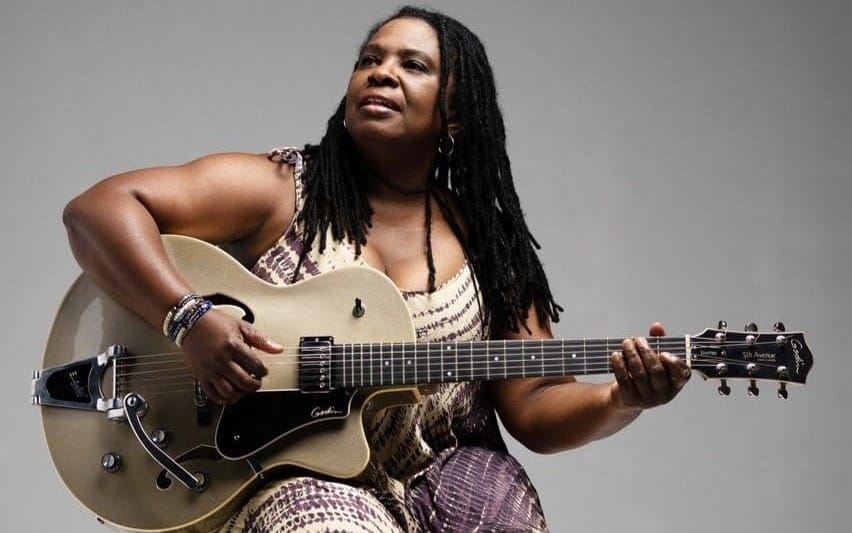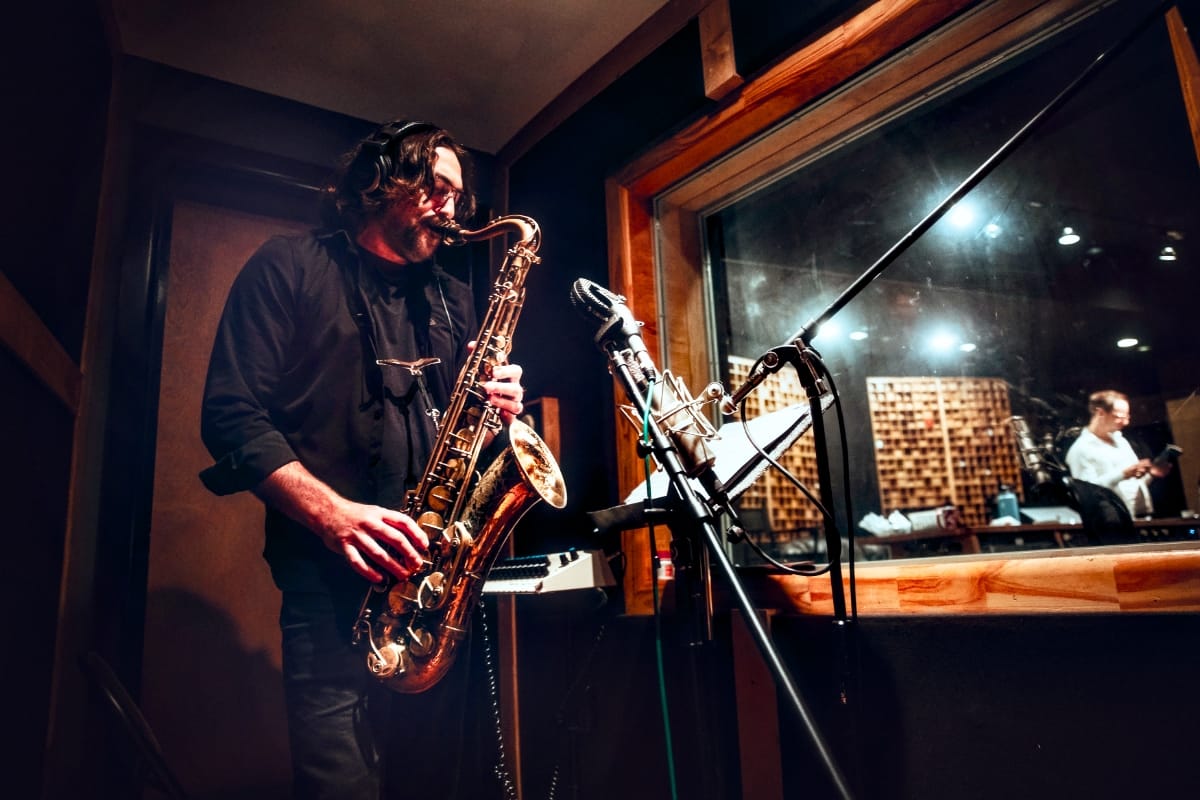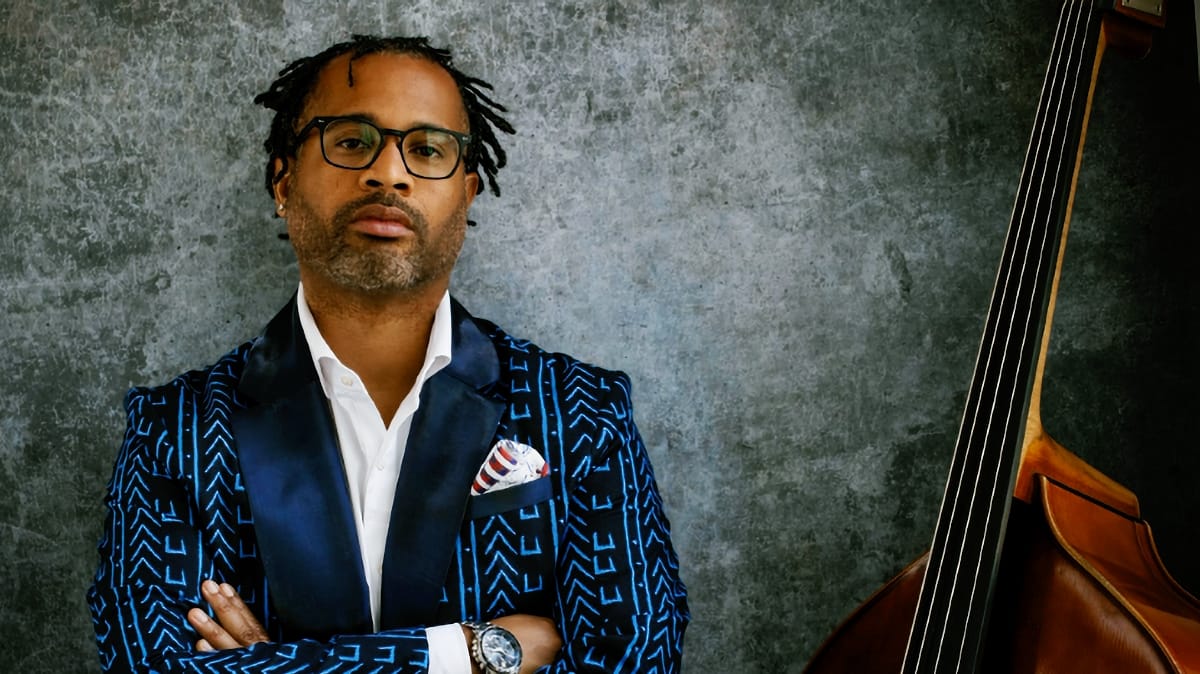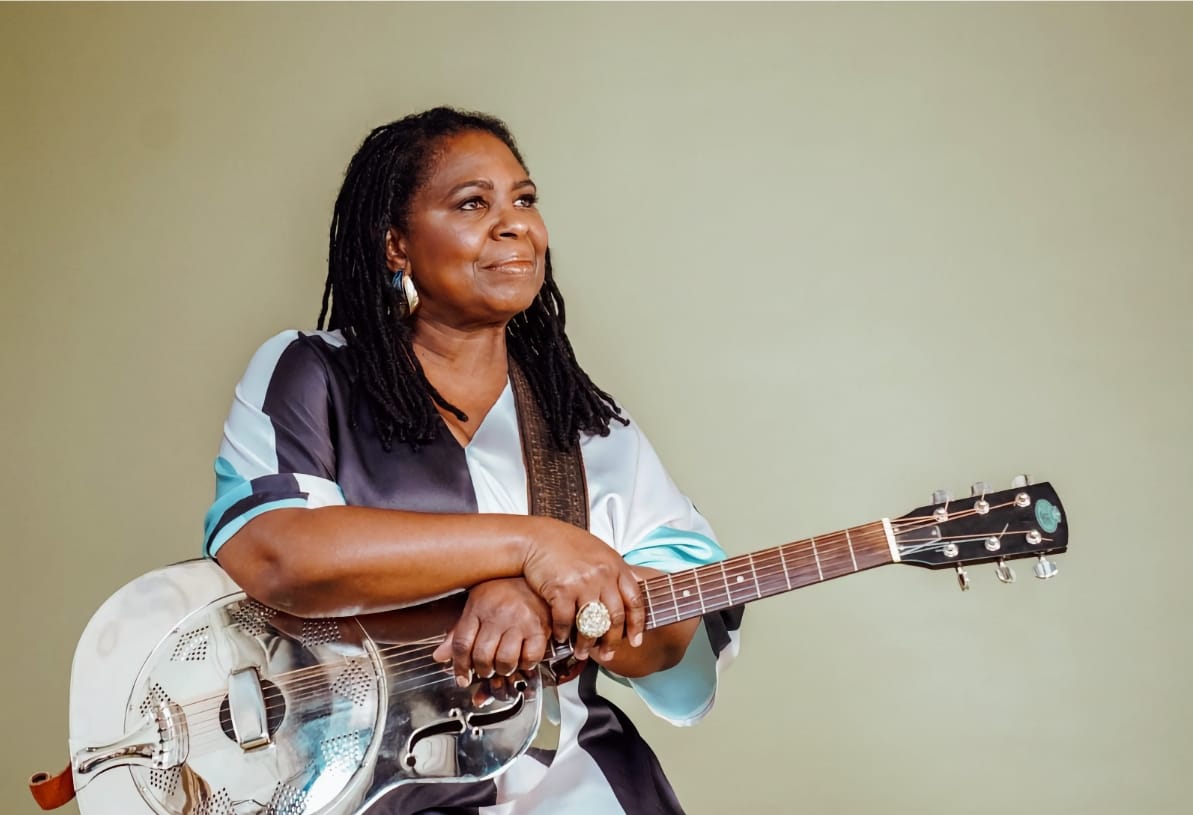Ruthie Foster has put in the miles. After years on the road playing clubs, theaters, and festivals across America and internationally, she knows exactly what "mileage" means—both as a musician and a human being. Her latest album, titled Mileage, marks her first release on the legendary Sun Records label.
At her home in Texas, Foster sat down to discuss the record's creation, which grew from intimate songwriting sessions with producer Tyler Bryant and his wife, Rebecca Lovell of Larkin Poe. The songs range from Foster's childhood memories to the physical toll of touring life, all delivered with her signature blend of blues, gospel, and soul. She even reclaims Arthur "Big Boy" Crudup's "That's All Right"—the song that launched Elvis Presley's career at Sun—by taking it back to its blues roots.
Foster spoke on topics ranging from singing in church choirs to her time in the Navy and how these experiences shape her songwriting and performance today. She shared stories about her mentors, including blues legend Ruth Brown and longtime friend Bonnie Raitt, revealing the deep connections between generations of artists.
'I Do My Homework'
Lawrence Peryer: Mileage is a great record. I've had it on repeat all weekend and into this morning. It's beautiful.
Ruthie Foster: Thank you. I'm proud of it, and it's almost like a part one. I was up late last night writing. It's been inspiring. This record was autobiographical for me.
Lawrence: Does it ever get old to say "GRAMMY-nominated"?
Ruthie: No, I like that. It's nice to be invited to the party, and it's a pretty nice party. Since the GRAMMYS have switched to peer voting, this music is all voted on by people I know and love. It means a lot.
Lawrence: I'm a GRAMMY voter as well. If you want to take it seriously, it takes a lot of work to go through and make sure you're not just checking the people you're most familiar with. Depending on the category you pick to vote in, you can devote a lot to it.
Ruthie: You are so right. I'm taking December off to chill after working all year, so it's nice to be home and listen to everything. You get to hear good albums, like with Shemekia [Copeland], a lovely, good friend.
Lawrence: There's only going to be one person that walks home with the GRAMMY. How do you feel when it's a friend or someone you've worked with who's also in the same category?
Ruthie: We might be good friends and acquaintances, or I don't know the other person in that particular category—in my case, contemporary blues. But I'll get to meet them if I'm there in LA for the red carpet-walk. You become a fan just by standing in front of these artists. It excites me to think about it because people you admire and love might sit two rows from you.
It's like a fan fest for me. I remember several occasions seeing Shemekia. We always end up in the same category and see each other. "Oh girl, where'd you get those shoes?" It's not about competition. It's about knowing that you're in the same place and finally get a chance to have a drink or just hang out.
I do my homework. I'm listening to several people in traditional and contemporary blues categories. It allows me to study a bit because I love learning. When I go out on tours, I'm one of those people who usually is in the middle of an online course on something.
I love music, but it's nice to unplug and try something else. Just having a conversation that has nothing to do with music—that's important to me, too. That had a lot to do with why I joined the Navy and was in the military. I just wanted to do something different.
Lawrence: Not everyone thinks when they want to shake things up, "Let's go join the military." It's bold.
Ruthie: It's bold, but I've always wanted to do it. It was more of that little black girl wanting to get out of a small town, and I found many men and women in the same position. A lot of the folks I ran into were from small towns—they just wanted to be able to travel and get out. That was a way to do that, to get out of that small pond.
In my case, I wanted to do something other than music because I've been playing music and performing since I was twelve, and I just turned sixty. So it's a long time in music and entertaining—churches, communities, schools—and what I've been doing professionally for the last thirty years. It was a way just to do something else: work on helicopters.

Six Mile Water
Lawrence: When I listened to Mileage, what stood out was that this is contemporary blues. As a listener, I recognize it in the lineage, but I also recognize it as very much of today, perhaps in the subject matter or production.
Ruthie: Coming from gospel, blues, Americana, folk-oriented music, especially being in Texas—and you can add country, Tejano, conjunto, and all of that—I have all that to stand on. That's my musical listening background. When we finished this album, I wasn't sure where it would land regarding genres.
I don't pick that. I make the music, sing, and write about things I'm looking at. I keep a list of the song titles in front of me for interviews because I can look at each one visually and see where I was when I wrote them. It's just really about the story for me.
This album is slightly different because I went to Nashville and wrote with incredible young songwriters. One was my producer, Tyler Bryant. I love the way he plays. And let's remember, I'm the guitar player in the band. So this is another way of learning, another school for me, learning more about the guitar and writing with him and his wife, Rebecca Lovell, from Larkin Poe.
It did unintentionally lean more toward Nashville. Nashville is not a genre. It's so mixed—it's not all country. It has so many incredible songwriters who write in every genre because they have to; that's how you keep the lights on.
This is my tenth album. I picked a different producer because I want to hear what they hear when I sing. It's a collaboration in writing, but it's also a collaboration in the production. Of course, there will be guitar and a rhythm section, but Tyler wanted to bring out brass when it came to horns and pump up the B3. He wanted to give that church sound.
This album ended up a bit of everything. There's "Six Mile Water," which I started writing years ago about where I'm from, just up the road in this little community called Six Mile, right on the Brazos River in Texas. It's a beautiful song. I grew up a river rat. And I was just thinking about my old folks still on the property.
I had a recent visit to my mother's grave, and there are beautiful things written on all of my relatives' graves. I thought: what would I want someone to say about me if they had to write just a few lines? "I'm your daughter. I travel so many miles away, but I'm home now. No more roaming now. Six Mile Water. Your daughter's here to stay." That's where it came from. Rebecca and Tyler took that and made it into the beautiful bouquet of dedication to my home and to my relatives that it is.
When the 'Real' Comes Out
Lawrence: How did you and Tyler get started?
Ruthie: I knew about Tyler because of YouTube. Every musician I knew was all over YouTube showing off their studios during the shutdown and the pandemic. We all spent a lot of time upgrading our studios because that's what we had. I met Tyler that way through another friend who owned a studio in Nashville.
I have the same management as his wife Rebecca and her sister Megan, also of Larkin Poe. So, it was just putting the dots together. I flew up to Nashville from Austin to hang out with them and see if we meshed and could get something started.
Tyler is very active, OCD in some ways, and walks around with a guitar. Rebecca sits on the couch, and I'm on the other end. We're just tossing ideas around. I think I had just come off tour. All three of us were always on tour, and we would come back and sit and write and then record downstairs in their house. That's where this record was made.
"Take It Easy" was probably the first. A lot was just me talking about coming off the tour and how tired I was. I needed to slow down and find a way to go to a beach and chill. We took the lyrics and decided to go downstairs, record the chorus, and then write as we went. I remember not being particularly okay with my vocals, but they assured me that the first take was the best.
We danced around each other for a while and then finally got comfortable. We'd take a break, eat some tacos, and start again. So it was a succession of two days at a time, every time I'd fly in, maybe once a month, over about ten months. We figured we could keep this going; let's keep finding time between tours.
Lawrence: It sounds much different from a commercial studio setting where it's a little more business, and the engineer has to come in and do all that. Was the place important?
Ruthie: It was important not to be in my environment, so I would have that sense of "I don't want to waste my time, and I don't want to waste yours. Let's get in here and see what happens." At the same time, I was tired—I'd come in from tours, and instead of flying home, I'd go straight to them. And there's something about when you're in that state—when the 'real' comes out. You drop your guard when you're tired.
Many of these songs came from conversations with these guys, especially Rebecca. I'm just touching base with a young female blues songwriter, guitarist, and multi-instrumentalist with an incredible voice. Our connection was really important to making this album. And I connected with Tyler right away. It's something about being Texan—he just became my little brother. "Hey, little bro, let's do it. Let's get this going." And I trusted his judgment on the takes, on how we will change this song.
"That's All Right, Mama"—we wanted to do this song, but how will we change that? So I let him do that, let him pick up the slide guitar. I think I had maybe two or three hours before I needed to be at the airport to fly back home when we decided to do that. We had extra time and thought, "Let's do something with this one. Let me just play something, and you sing over it." That's how it happened.
Lawrence: You went with the original arrangement, not the Elvis version. That's interesting, given the Sun Records connection.
Ruthie: Yeah, that had a lot to do with Tyler. He's friends with Dominic [Pandiscia] on the Sun label team. Dominic had come in to hear a couple of songs. We only had four tunes when he and Peter Leak, my manager, came, and they just sat and listened to it. That's how that happened. Sun wanted to sign me, which was great.
Dominic and Tyler are friends, both guitar guys—they talk guitar whenever they are together. And hey, I can hang, too; it's all good. But we were just playing around with maybe pulling something out of the archives and seeing what we could come up with. And I had just been reading about Arthur Crudup. I downloaded some of his stuff because I love listening to old blues.
I learned how to play guitar by playing front porch blues—what I call it here in Texas. Lightnin' Hopkins, that's all front porch blues. Everybody who plays guitar here in Texas plays like that—even Tyler, who learned from these old guys living in East Texas. So, we wanted to bring it back to the original version of that song. And it also gives me something to talk about in my shows, to remind people where the song came from. Reclaim it. Give it back to Arthur "Big Boy" Crudup.
Lawrence: That song to me is just a country blues—you can hear everything that came before it and everything that the blues did when it sucked in the Appalachian music. There's even a swing to that song—it has its rhythm and chugs along. It's just a great American song.
Ruthie: It is. Back in those days, you had a lot of those players who would borrow songs from different people. Crudup has his version of "Mean Old Frisco," but everyone has their own style. And I love that we mixed some of that country blues with Tyler's tone, which he chose for that particular slide. His tone on his guitar is incredible. I can never come close to that in my shows, but I'm working on it.
More Miles Than Most
Lawrence: You talked about that space between the road and home. That's in the title—you're feeling the miles and acknowledging the mileage, and it's all right there.
Ruthie: We looked at the body of songs and thought we needed a title, and "Mileage" just says it all. I talked to Tyler and Rebecca about how it takes a team to put me back together these days. After returning from the tour, I need to see my acupuncturist and physical therapist because my knees are falling apart. It takes so many people to put me back together and send me back out there.
I remember telling one of my doctors, "Man, this age thing, I don't know if I can keep doing this music thing and getting out here and dragging a guitar, two guitars sometimes, suitcase, what this is doing to my knees?" And he said, "No, you have to look at it—it's not age. It's the miles. You have more miles than most right now. So it's just mileage."
So it went from a title; the rest was about my life on the road. I appreciate all these places we see, even though we don't spend much time there. I do my best to get out, take a walk, and breathe in the air in places like Lucerne, Switzerland, and Southampton in the UK, and I get to share that with people. It's a real privilege to do what you love and make a living from it.
Lawrence: When you leave the US, is your experience on stage the same? Do you notice different things about different audiences?
Ruthie: Every audience is different, so I wait until the last minute to make a setlist. I'm reading where we are and the atmosphere. Sometimes, I walk out to the room and peek at who's there; what does the place look like? And I'll even change the setlist once we're on stage. My fellows know this about me. For the most part, I follow it, but I will change a few things.
It depends on what I'm getting visually and what I'm picking up in the room. And every show makes me so nervous. But that's energy. A great voice teacher taught me that it's a good thing—it's just nerves, and it can be used for the show. You can use that to portray where you are emotionally, and where you are emotionally is everything.
I tell all of my mentees—I'm a mentor for a couple of different up-and-coming artists—that emotion you're going through right now, that's what you use. That's the fuel. That's the stuff that goes into the song. That's the stuff that's going to change your phrasing. That stuff might have you forgetting a word or two, but you find your way back. That stuff will have you hanging off the cliff, and you have no idea what's about to happen. And people pick up on that. People notice that. That's the stuff that makes you a very different artist from anyone else. That's the stuff that's all you. And if you cry, it's okay to cry.
The Student and the Elder
Lawrence: What's your self-image now as a woman of a certain standing? You've got your accomplishments, but I'm sure you still have your aspirations. Are you an elder, or are you still a student at the knee?
Ruthie: I see myself as both the student and the elder because I think as an elder, part of what you give to people you're still learning. Friends will ask me, "How do you know this stuff?" And my only answer is, "I've messed up enough. I've messed up a lot." Those were my lessons, and I didn't get them right.
I still remember sitting in front of Ruth Brown at a recording session here in Austin and hearing her speak about some of the things she wanted to do. This happened just a couple of years before she passed. She also talked about how she wished she could do a gospel album. And I thought, Ruth Brown, who's done it all, big band to blues, singing in front of these incredible people, and she's met Dr. Martin Luther King. She says, "I wish I could have done a gospel album for Dr. King." And she was almost in tears talking about this, and I was just sitting at her feet.
I'm still that person. I'm still learning from my elders, those who are here, and those who have moved on. Phoebe Snow is another one. I still remember helping her assistant take her shoes off after her set at the Portland Music Festival and how tired she was. Being in the presence of these incredible writers and women is so important to me.
Bonnie Raitt is another one. I still consider Bonnie as a mentor. We get to talk and be in the same room together. I learned so much about, if anything, just how she holds herself, how she holds the space, and how gracious she is in that space, on stage and off stage.
As an elder, I try to conduct myself in that way by being open so that someone feels they can come up and talk. That was important to me when sitting on the couch with someone like Rebecca Lovell. I wanted to hold a space for her to open up and tell me what was happening. And introduce her to people she hadn't heard of, like Janis Ian. She had never heard her music before. So I guess I'm in between this space of having done a lot but still having a lot of road to go. I have a lot of mileage left.
Lawrence: It's really interesting to hear you articulate that specific list of women because this is a group of people that defied a lot of stereotypes. They are strong, beautiful, feminine, not pushovers. It's incredible to be part of that lineage and be a teacher for someone else.
Ruthie: I'm very fortunate. I found myself in the room with Bonnie, James Taylor, and Paul Simon one night when they were all here to raise money for one of the hurricanes that went through Texas and devastated several communities. It was so cool to be in the same room and commune over music—giving to the community, sharing your talent, and extending what you can do to help raise money.
It was a huge lesson and reminder that I'm out here doing this thing called music, being a musician for people, but I can also help people in a bigger way. When I play Austin, you will see me in the community helping raise money for people, especially musicians who can't go out and tour, and raising money for people who need mental and physical health assistance. That's where you will see me in Austin with my music. I can go outside of Austin and make money and pay my bills, but when I'm here, I try to see to my people.
Lawrence: You mentioned earlier that maybe there's a sequel to Mileage in you. What is it "part one" of?
Ruthie: I think it's part one of where I am as a songwriter and an artist in telling my story. This is the first time I feel I have an entire body of work that tells my story. Different parts of it—where I'm from, where I've been for the last year, and you can go month per month. That's where I was. "Yep, that's where I was that month."
Last night, I was up at three o'clock in the morning, basically talking to myself and singing to myself. It was about singing my truth and the fact that my brain just wouldn't shut down. I couldn't go to sleep until this happened. "You got to get up, girl. I know you're tired. You got to get up and put this down."
I don't know what's going to come of it. I don't remember the title right now—something to do with trains. I have a train track right behind my house, and I love it. I grew up with trains close by. And I think that says it all. I'm basically just in this place where I'm writing about what's real to me, and hopefully, someone else can relate to it, but meanwhile, I'm just getting it all out while I can.
Ruthie Foster’s Mileage has been nominated for the 67th Annual GRAMMY Awards in the Best Contemporary Blues Album category. Remarkably, Mileage is the first Sun Records album to receive a GRAMMY nomination.
Check out more like this:
 The TonearmLawrence Peryer
The TonearmLawrence Peryer
 The TonearmLawrence Peryer
The TonearmLawrence Peryer







Comments